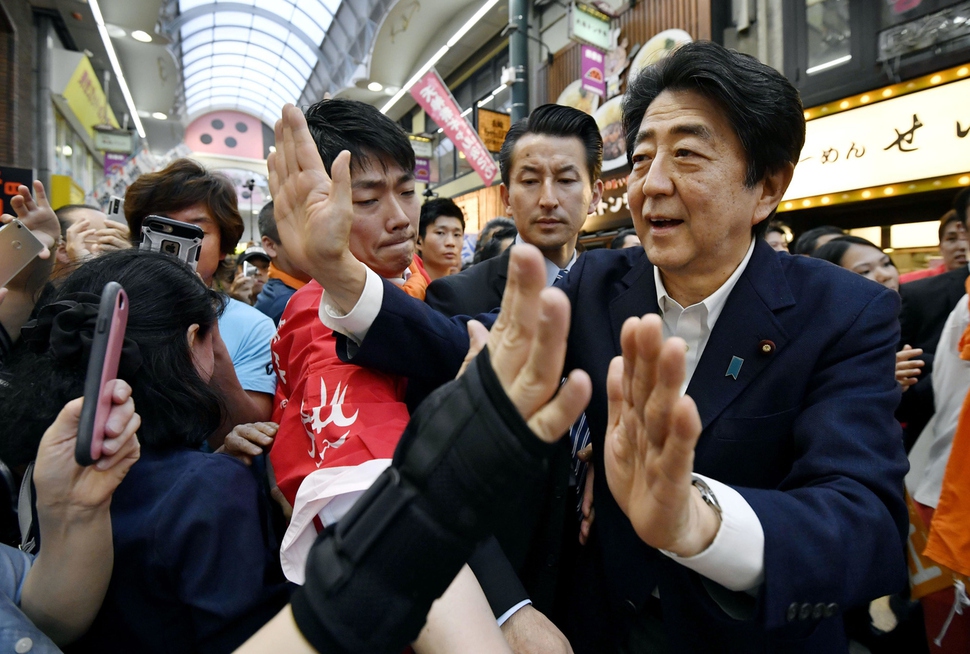 |
|
Prime Minister Shinzo Abe during a campaign rally in Osaka on July 7. (Yonhap News)
|
Relying on WTO conflict resolution procedures could take years
When the Japanese government imposed retaliatory measures on exports to South Korean government, its initial justification was that bilateral trust had been damaged. But when it became clear that this was a poor legal justification in light of international trade norms, Tokyo has shifted to a new reason, namely that there have been “inappropriate issues” in the management of exports of strategic materials. Experts think that Japan has settled on a strategy of buying time by making ambiguous claims about “inappropriate issues” without providing any kind of evidence, based on its belief that an attempt to resolve this conflict on an international level will become protracted. In principle, the World Trade Organization (WTO), which manages the international trade regime, doesn’t allow its members to ban or limit exports to each other. That said, Article 21 of the General Agreement on Tariffs and Trade (GATT), which outlines the WTO’s rules, does allow security-based exceptions, however. According to that article, member countries can regulate the import and export of materials such as military armaments and fissile material in order to protect their key national interests. That’s the article that was cited by US President Donald Trump when he applied Section 232 of the Trade Expansion Act to imports of steel and automobiles, which he described as a threat to national security, and when China took retaliatory measures in response to the planned deployment of the US’ THAAD missile defense system in South Korea. Japanese Prime Minister Shinzo Abe also abruptly brought up the security exception when he mentioned “inappropriate issues” apparently involving North Korea as the reason for restricting exports on July 7. But Abe didn’t provide any specific evidence about what those “inappropriate issues” are. “If these issues were so important, Japan ought to be talking about what year they occurred and which companies were involved instead of keeping it under wraps. If Japan is confident in its claims, it needs to provide the details. It’s irresponsible and improper for Tokyo to have politicians such as the secretary-general of the Liberal Democratic Party make bland remarks about ‘inappropriate issues,’” a senior official in the South Korean government responsible for trade told the Hankyoreh over the phone. The Japanese have adopted the strategy of hinting that South Korea is to blame by claiming that the “inappropriate issues” have been continuing for at least three years. South Korean Trade Minister Yoo Myung-hee, who will soon be sent on an urgent mission to the US, has declined to provide any information about the purpose of her mission, but experts think she’s likely aiming to look into the facts pertaining to Japan’s claims about the import and export of strategic materials for collective security and to organize deliberations. According to some experts, Japan’s pivot to an ambiguous claim about “inappropriate issues” related to exports of strategic materials is designed to exploit the South Korean government’s dilemma about initiating conflict resolution procedures at the WTO. It could take several years to reach a final decision under the WTO’s dispute resolution framework, which wouldn’t provide relief for the immediate hardship faced by South Korean companies. And even if South Korea won the lawsuit, it wouldn’t be easy to force Japan to withdraw the retaliatory measures or provide restitution. Victory in the lawsuit would only give South Korea clearance from the WTO’s dispute resolution body to impose its own restrictions on the imports of other Japanese goods. That makes it tricky for South Korea to devise contingency plans about what steps to take after filing and potentially winning a complaint and about how to respond to the subsequent fallout. The conflict resolution process could involve a protracted dispute between the two countries about providing evidence for the “inappropriate issues.” “South Korea is regarded by the international community as a country that has faithfully implemented its duties in regard to controlling [strategic materials]. We will make a level-headed response to Japan’s unreasonable claims,” the trade official said. By Cho Kye-wan, staff reporter Please direct comments or questions to [english@hani.co.kr]






